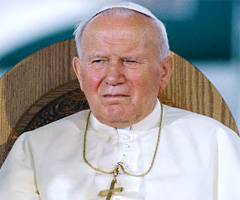 The Catholic church is reeling from the several sexual abuse allegations that have come to light over the past three months. Downplaying the severity of this scandal will only further damage the already beleaguered church's image and credibility. Many in the media blame Pope Benedict XVI for the mismanagement of the sexual abuse crisis. Pope Benedict certainly deserves some blame for his relative indifference to the sexual abuse allegations while prefect of the Congregation for the Doctrine of the Faith. But what about his predecessor, Pope John Paul II? Questions are now swirling in the media over John Paul's involvement in the cover-up of sexual abuse allegations. The time has come to reconsider the legacy of this paradoxical public figure. And with the Vatican proceeding with unusual haste to beatify and then canonize the late pontiff, justice and compassion for the victims demand that we examine his role in the sexual abuse crisis.
The Catholic church is reeling from the several sexual abuse allegations that have come to light over the past three months. Downplaying the severity of this scandal will only further damage the already beleaguered church's image and credibility. Many in the media blame Pope Benedict XVI for the mismanagement of the sexual abuse crisis. Pope Benedict certainly deserves some blame for his relative indifference to the sexual abuse allegations while prefect of the Congregation for the Doctrine of the Faith. But what about his predecessor, Pope John Paul II? Questions are now swirling in the media over John Paul's involvement in the cover-up of sexual abuse allegations. The time has come to reconsider the legacy of this paradoxical public figure. And with the Vatican proceeding with unusual haste to beatify and then canonize the late pontiff, justice and compassion for the victims demand that we examine his role in the sexual abuse crisis.
In his book Souled Out: Reclaiming Faith and Politics after the Religious Right, journalist E.J. Dionne Jr. claims that "if so much of what the pope did in relation to the world outside the Church was progressive, so much of what he did inside it was conservative."
His encyclicals challenged both socialism and capitalism and what he called the "Culture of Death." He advocated for the rights of the poor and socially marginalized, and his 1990 World Day of Peace message, Peace with God the Creator, Peace with All of Creation, remains, despite its weaknesses, perhaps the most significant ecological statement ever issued by a pope. Many scholars and journalists also cite his influence in the collapse of communism in Europe.
Yet, Dionne tells us, "The pope's insistence on democracy outside the Church
Got something to say about what you're reading? We value your feedback!